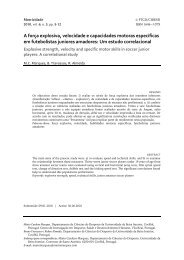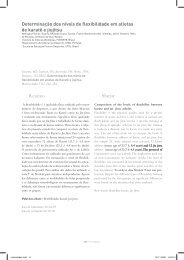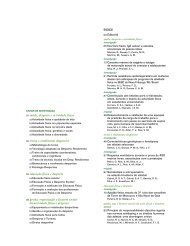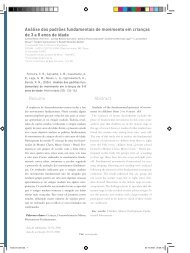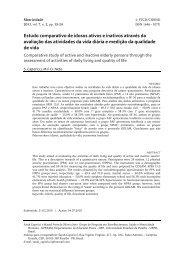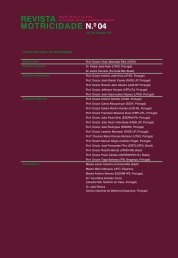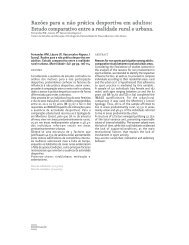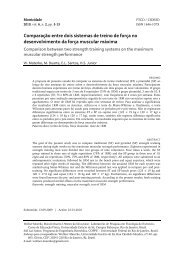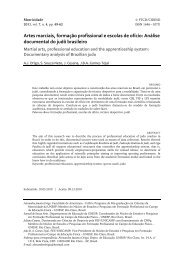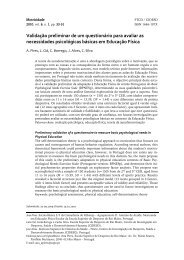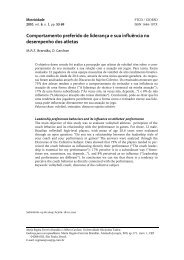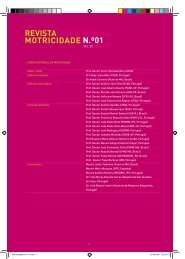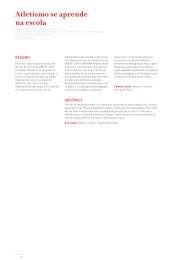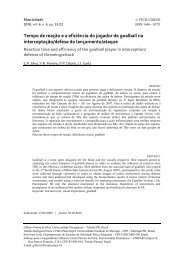revista motricidade
revista motricidade
revista motricidade
- No tags were found...
Create successful ePaper yourself
Turn your PDF publications into a flip-book with our unique Google optimized e-Paper software.
ACTN3 R577X polymorphism | 71<br />
extensor strength training in older men (n =<br />
71; 65-81 years) and women (n = 86; 64-73<br />
years). In men no differences in baseline<br />
absolute was observed between ACTN3<br />
genotype groups but in women, the XX<br />
genotype group had an absolute peak power<br />
that was higher than the RR (p = .005).<br />
Recently, Fiuza-Luces et al. (2011)<br />
compared the ACTN3 genotype frequencies<br />
between different groups of ethnicallymatched:<br />
centenarians (57 female; 100-108<br />
years), young healthy controls (67 females,<br />
216 males; 21 years), and humans with<br />
different phenotypes (50 male professional<br />
road cyclists and 63 male jumpers/sprinters).<br />
Although there were no differences in<br />
genotype, significantly frequency of the XX<br />
genotype (p = .011) were found in<br />
centenarians compared with power athletes<br />
(XX = 15.9%). Thus, alpha-actinin-3<br />
deficiency suggests a certain association to<br />
endurance muscle phenotype and muscular<br />
weakness. Thus, it is necessary to develop<br />
more studies in the elderly population in order<br />
to analyze the variation of ACTN3 in muscle<br />
performance ACTN3.<br />
CONCLUSIONS<br />
The ACTN3 R577X polymorphism results<br />
in a well-defined phenotype and has a<br />
biologically plausible effect on skeletal muscle<br />
performance in athletes and in the general<br />
population; that is, loss of α-actinin-3 from<br />
fast-twitch muscle fibers is detrimental to<br />
sprint and power activities. Whether or not α-<br />
actinin-3 deficiency influences adaptations for<br />
endurance performance is less clear; there may<br />
be more subtle effects that remain to be<br />
explored such as the effect on response to<br />
exercise and training. Future studies of the<br />
advantages and disadvantages that the ACTN3<br />
X-allele has to be developed.<br />
REFERENCES<br />
Ahmetov, I. I., & Rogozkin, V. A. (2009). Genes,<br />
athlete status and training - An overview.<br />
Medicine and Sport Science, 54, 43-71.<br />
Ahmetov, I. I., Druzhevskaya, A. M., Astratenkova,<br />
I. V., Popov, D. V., Vinogradova, O. L., &<br />
Rogozkin, V. A. (2010). The ACTN3 R577X<br />
polymorphism in Russian endurance athletes.<br />
British Journal of Sports Medicine, 44(9), 649-652.<br />
Berman, Y., & North, K. N. (2010). A gene for<br />
speed: The emerging role of alpha-actinin-3 in<br />
muscle metabolism. Physiology, 25(4), 250-259.<br />
Blanchard, A., Ohanian, V., & Critchley, D. (1989).<br />
The structure and function of alpha-actinin.<br />
Journal of Muscle Research and Cell Motility, 10(4),<br />
280-289.<br />
Bray, M. S., Hagberg, J. M., Perusse, L., Rankinen,<br />
T., Roth, S. M., Wolfarth, B., … Bouchard, C.<br />
(2009). The human gene map for performance<br />
and health-related fitness phenotypes: The<br />
2006-2007 update. Medicine & Science in Sports &<br />
Exercise, 41(1), 35-73.<br />
Clarkson, P. M., Devaney, J. M., Gordish-Dressman,<br />
H., Thompson, P. D., Hubal, M. J., Urso, M., …<br />
Hoffman, E. P. (2005). ACTN3 genotype is<br />
associated with increases in muscle strength in<br />
response to resistance training in women.<br />
Journal of Applied Physiology, 99, 154-163.<br />
Coffey, V. G., & Hawley, J. A. (2007). The molecular<br />
bases of training adaptation. Sports Medicine,<br />
37(9), 737-763.<br />
Delmonico, M., Kostek, M., Doldo, N., Hand, B.,<br />
Walsh, S., Conway, J., … Hurley, B. (2007).<br />
Alpha-actinin-3 (ACTN3) R577X polymorphism<br />
influences knee extensor peak power<br />
response to strength training in older men and<br />
women. Journals of Gerontology Series A: Biological<br />
Sciences and Medical Sciences, 62(2), 206-212.<br />
Druzhevskaya, A. M., Ahmetov, I. I., Astratenkova,<br />
I. V., & Rogozkin, V. A. (2008). Association of<br />
the ACTN3 R577X polymorphism with power<br />
athlete status in Russians. European Journal of<br />
Applied Physiology, 103(6), 631-634.<br />
Eynon, N., Duarte, J. A., Oliveira, J., Sagiv, M.,<br />
Yamin, C., Meckel, Y., … Goldhammer, E.<br />
(2009). ACTN3 R577X polymorphism and<br />
Israeli top-level athletes. International Journal of<br />
Sports Medicine, 30(9), 695-698.<br />
Fiuza-Luces, C., Ruiz, J. R., Rodriguez-Romo, G.,<br />
Santiago, C., Gomez-Gallego, F., Yvert, T., …<br />
Lucia, A. (2011). Are 'endurance' alleles<br />
'survival' alleles Insights from the ACTN3<br />
R577X polymorphism. PLoS One, 6(3), e17558.<br />
Gomez-Gallego, F., Santiago, C., Gonzalez-Freire,<br />
M., Muniesa, C., Del Valle, M. F., Perez, M., …<br />
Lucia, A. (2009). Endurance performance:



